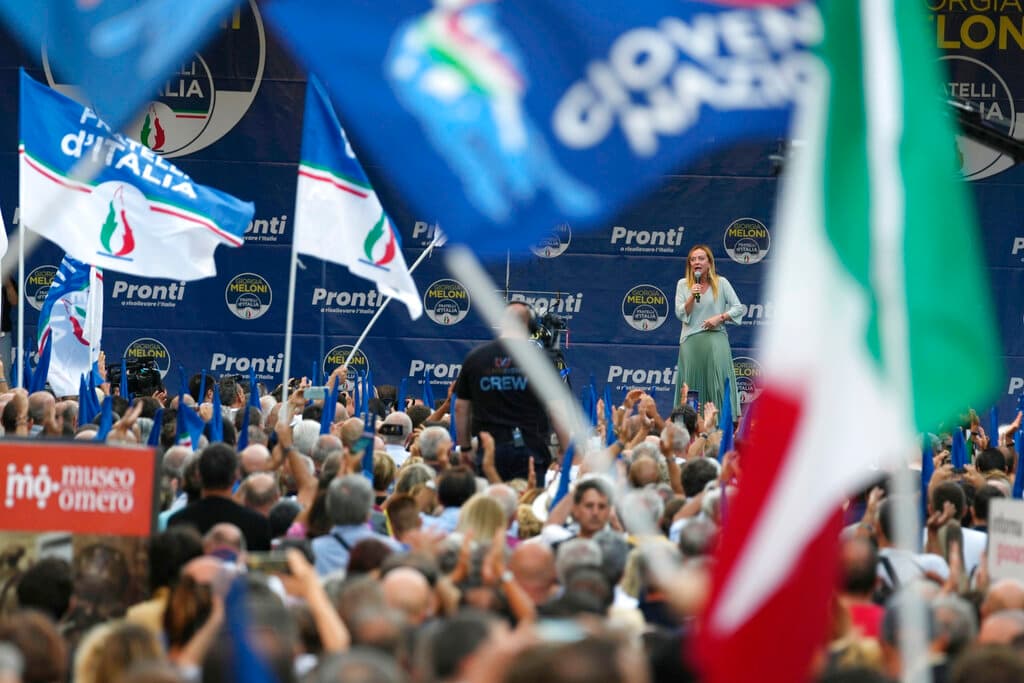A Woman’s World: Truss at 10 Downing, Italy’s Meloni on the Up, and More
It would appear that European menfolk — at least the ones with political aspirations — will have some catching up to do this fall.

Once again, Britain is leading the way: Elizabeth “Liz” Truss’s ascent to 10 Downing Street not only makes her the third British female prime minister but telegraphs to the rest of the Continent that women leaders’ time to shine is nigh. On Tuesday evening, Ms. Truss appointed a woman, Therese Coffey, to the role of deputy prime minister, and another, Suella Braverman, as the home secretary. Change is indeed in the early autumn air.
One country that got the memo is Italy, where national elections are less than three weeks away and the frontrunner is a woman, the energetic leader of the national-conservative Brothers of Italy party, Giorgia Meloni. Italian newspaper La Stampa has already branded her “the Italian Liz Truss” — though how accurate a comparison that is could be up for some debate. Like Ms. Truss, Ms. Meloni is tough, politically astute, and savvy enough to know that even with momentum on one’s side, no campaign’s outcome is completely predictable.
Like Ms. Truss, Ms. Meloni is in her mid-40s, which in today’s world qualifies as young. Opinion polls place Ms. Meloni in the top spot in her bid to become Italy’s first female prime minister. She is already the first Italian to speak at CPAC, having done so in 2019, and her far-right Brothers of Italy party is making a robust showing in the polls, undermining one of her allies, Matteo Salvini.
Mr. Salvini heads the anti-immigrant Northern League party. La Stampa, which broke the news of Mr. Salvini’s unseemly affinities for Moscow, reported Tuesday that the outspoken Mr. Salvini is working overtime to “sabotage” Ms. Meloni’s campaign, but the leading contender for Rome’s top job appears unphased. The report may even be an exaggeration: If Mr. Salvini’s criticisms of sanctioning Russia are at odds with Ms. Meloni’s unvarnished support of Ukraine, bombast is part and parcel of Rome’s pre-electoral theatrics. The bigger worry for Ms. Meloni is a former center-left premier, Enrico Letta, but ahead of the September 25 election Mr. Letta has yet to assemble a viable coalition.
Europe’s rising women leaders are dominating media coverage across the Continent. Ms. Truss, it is worth remembering, served as Britain’s foreign secretary under Prime Minister Johnson. In that role, and against the backdrop of the Russian invasion of Ukraine, she sharpened her diplomatic acumen and arguably built up some of the momentum that pushed her squarely ahead of her chief rival to the Tory party leadership, Rishi Sunak. When Moldova, the tiny country bordering Ukraine and that is within the Kremlin’s long-term strategic sights, sought defense assistance, it was Ms. Truss and not Mr. Johnson who met with the president, Maia Sandu — also a woman.
The Telegraph reported Wednesday that “for the first time in history, none of the Great Offices of State — Prime Minister, Chancellor, Home Secretary and Foreign Secretary — is held by a white man,” though Ms. Truss has reappointed Ben Wallace as defense minister. That is a key position in Westminster, and one with arguably more clout than foreign secretary.
Still, the international roles will increasingly be seen as paths forward for women leaders to burnish their credentials. For further evidence of that, look to Paris, where Catherine Colonna has served as foreign minister under Prime Minister Élisabeth Borne since last May. Even more so than Germany’s female minister of foreign affairs, Annalena Baerbock, Ms. Colonna has emerged as a resolute voice in strategic European matters beyond the Russia-Ukraine theater. In the ongoing tussle between Greece and Turkey over maritime issues and Ankara’s spurious territorial claims over some Greek islands, Ms. Colonna has sided squarely with Athens.
France and Greece signed a mutual defense agreement in September 2021 and yesterday Ms. Colonna reminded Turkey of that commitment. Following a meeting with her Greek counterpart, Nikos Dendias, she said that “we were on Greece’s side and we will continue to be,” adding that if France and Greece “find that there is an armed attack on territory of one or the other country, there is mutual assistance.”
With a Frenchwoman warning Turkey’s bumptious president that calming the waters would be wiser than stirring them up, a fiery lady taking on male-dominated politics in Italy, and Ms. Truss at the helm at Number 10, it would appear that European menfolk — at least the ones with political aspirations — will have some catching up to do this fall.

